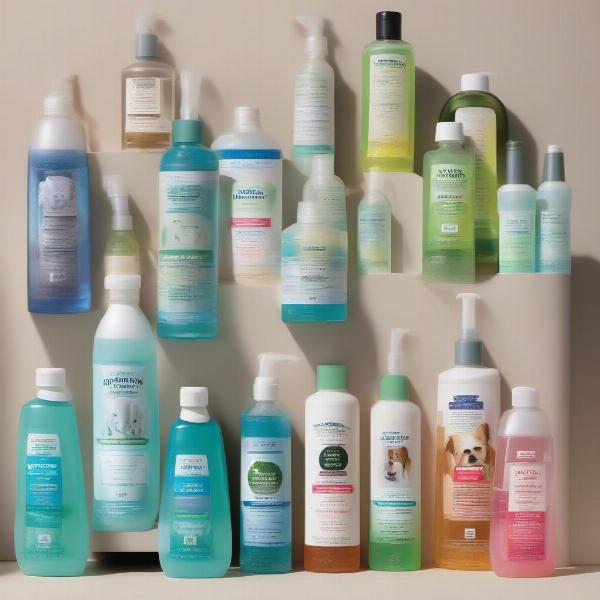Dental mouthwash for dogs is becoming increasingly popular as pet owners recognize the importance of oral hygiene for their furry friends. Just like humans, dogs can suffer from plaque buildup, bad breath, and gum disease. Using a dental rinse can be a simple yet effective way to supplement brushing and maintain a healthy mouth for your dog. This guide will explore the benefits, types, and proper usage of dental mouthwash for dogs, providing you with the knowledge to choose the right product and keep your canine companion’s teeth sparkling clean.
Understanding the Benefits of Dental Mouthwash for Dogs
Dental mouthwash offers several benefits for your dog’s oral health. It helps to:
- Reduce Plaque and Tartar: Many dental rinses contain ingredients that help break down plaque and prevent tartar buildup, reducing the risk of gum disease.
- Freshen Breath: Bad breath in dogs is often a sign of underlying dental issues. Mouthwash can neutralize odor-causing bacteria, leaving your dog with a fresher breath.
- Soothe Irritated Gums: Some mouthwashes contain ingredients with anti-inflammatory properties, which can help soothe irritated gums and promote healing.
- Improve Overall Oral Health: Regular use of dental mouthwash, along with brushing, can significantly improve your dog’s overall oral hygiene and prevent serious dental problems.
Types of Dental Mouthwash for Dogs
There are various types of dental mouthwash available for dogs, each with its specific benefits and ingredients.
Chlorhexidine Mouthwash
chlorhexidine mouth rinse for dogs
Chlorhexidine is a powerful antiseptic that effectively kills bacteria and controls plaque and gingivitis. It’s often prescribed by veterinarians for dogs with existing dental conditions.
Antibacterial Mouthwash
antibacterial mouth rinse for dogs
Antibacterial mouthwashes contain ingredients that target and eliminate bacteria, helping to prevent plaque buildup and bad breath.
Enzyme-Based Mouthwash
Enzyme-based mouthwashes use natural enzymes to break down plaque and tartar. They are a gentler option for dogs with sensitive mouths.
Natural Mouthwash
Some mouthwashes are made with natural ingredients like aloe vera, peppermint, or tea tree oil, which offer soothing and antibacterial properties.
Choosing the Right Dental Mouthwash for Your Dog
 Different Types of Dog Dental Mouthwash
Different Types of Dog Dental Mouthwash
Selecting the appropriate dental mouthwash depends on your dog’s specific needs and any existing dental conditions. Consult your veterinarian for recommendations tailored to your dog’s health.
How to Use Dental Mouthwash for Dogs
Using dental mouthwash is generally straightforward. Follow these steps:
- Choose a dog-specific mouthwash. Never use human mouthwash on your dog.
- Measure the correct dosage as instructed on the product label.
- Gently lift your dog’s lips and pour the mouthwash into their mouth.
- Try to prevent your dog from swallowing the rinse immediately. Allow it to contact their teeth and gums for a few seconds.
- Most dental rinses do not require rinsing with water.
Is a Dog’s Mouth Cleaner Than a Human’s?
is a dog mouth cleaner than a human mouth
The myth that a dog’s mouth is cleaner than a human’s is simply not true. While dogs have different oral bacteria than humans, their mouths still harbor a significant amount of bacteria that can cause dental problems.
Conclusion
Dental mouthwash can be a valuable addition to your dog’s oral hygiene routine, helping to prevent plaque, freshen breath, and maintain healthy gums. By understanding the different types of mouthwash available and following the correct usage guidelines, you can contribute significantly to your dog’s overall health and well-being. Remember to consult with your veterinarian for personalized advice and recommendations.
FAQ
- How often should I use dental mouthwash on my dog? Follow the instructions on the product label. Most recommend daily or every other day use.
- Can I use human mouthwash on my dog? No, human mouthwash often contains ingredients like xylitol which are toxic to dogs.
- What are signs of dental problems in dogs? Bad breath, excessive drooling, difficulty chewing, red or swollen gums, and loose teeth are all potential signs of dental issues.
- Are there any side effects of using dental mouthwash for dogs? Some dogs may experience mild gastrointestinal upset if they swallow large amounts of mouthwash.
- Is dental mouthwash a replacement for brushing my dog’s teeth? No, mouthwash should be used in conjunction with regular brushing for optimal oral hygiene.
- What should I do if my dog refuses to let me use mouthwash? Try introducing the mouthwash gradually and rewarding your dog with treats. You can also consult your vet for alternative application methods.
- Can I make my own dog dental mouthwash? While there are DIY recipes available, it’s best to use commercially available products specifically formulated for dogs to ensure safety and efficacy.
Looking for more information on dog dental care? Check out these related articles:
ILM Dog is your trusted resource for all things dog-related. From breed selection and health care to training and nutrition, our team of experts provides practical, reliable advice to dog owners worldwide. We offer a range of services designed to support the well-being of your furry friend. Whether you’re a new dog owner or a seasoned pro, ILM Dog is here to help you navigate every aspect of dog ownership. For expert guidance on dog dental care or any other dog-related queries, feel free to contact us. Email: [email protected], Phone: +44 20-3965-8624. Visit us at ILM Dog for more information.